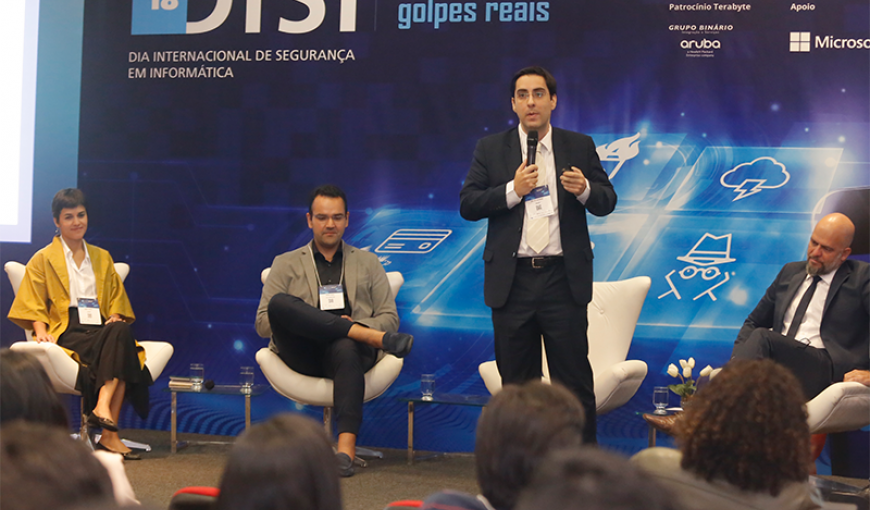Roundtable on fake news is highlight at the Disi 2018
The 2018 edition of the International Informatics Security Day (Disi) dove into the topic of 'Virtual fraud, real scams' and discussed the primary types of fraud that exist over the Internet. The event took place on August 30th at the National Confederation of Commerce Workers (CNTC), in Brasília-DF.
The phenomenon of fake news
The debate on fake was the highlight at the Disi 2018. In election years, the practice of disseminating fake news grows, and, with the intention of raising user awareness on the real damages caused by it, the event promoted a panel with representatives from the journalism, legal, social media, and technology sectors.
The Correio Braziliense journalist Leonardo Cavalcanti opened the debate and presented the public the backstage of how a fake news editor operates. He, who is working on a series of pieces on fake news for the Correio, has been revealing how criminal networks cause misinformation in an organized manner to promote attacks targeted at specific groups. “Fake news mix reality and fiction, in time and space, to plant doubt,” defined Cavalcanti.
Walter Capanema, a lawyer specialized in Technology and Education, alerted on the legal implications to users that become victims of fake news, such as libel, misinformation, and false exaltation. “Misinformation resonates more than information,” stated Capanema.
Facebook Public Policies manager Rebeca Garcia stressed that the social network strives to reprimand fake accounts through its policy of authenticity. “People tend to behave more responsibly when they use a real name and picture,” she explained, adding that the act of user reporting is vital to identify fake profiles. In total, Facebook has already recorded 680 million fake accounts in the platform.
UPX Technologies CEO Bruno Prado shared a few tips with the DISI audience to help verify the authenticity of things. Amongst them is the act of checking the source of the news, the reliability of the author, and suspicion of typos and spelling mistakes.
When creativity is used for cybercrimes
At the meeting, there was also a panel that showcased Brazil as a leading expert when it comes to cybercrime. Aldo Albuquerque, managing partner of Tempest Security, highlighted the creation of new models of data theft techniques, known as phishing. An expert on the subject, the speaker emphasized the enormous increase in cases of data theft. “The more people are on the internet, the more people there are to be victims of theft or fraud. Another reason for that is our legal system, which is fragile and confusing, in addition to the sense of impunity. There is also a lack of a security culture in companies and in people. Nowadays, more people are doing business over the Internet. Thus, there are more possibilities for fraud,” he explained during his presentation.
A journey through time: the evolution of internet scams
Sandro Suffert, Executive Director of Apura Cybersecurity Intelligence with over 20 years of experience in the technology industry, took participants on a journey through time to contextualize the evolution of internet scams. “Back in the 1980’s, there was this romanticized notion of nerds wearing glasses making and spreading viruses. They wanted to beat each other and were good developers. Some would hack into government institutions just to prove how good they were. Starting in 2000, that changes a bit, and we begin to see the organized crime taking advantage of that. Criminals realized they could rob a bank without ever setting foot on it bearing a gun. These menacing agents started adding up and, from 20120, we began noticing that States and Nations also conduct cyber attacks and espionage,” declared Sandro.
Federal Public Ministry actions to combat cybercrime
The work of the Federal Public Ministry in combating cybercrime was the topic of the lecture by Neide de Oliveira, regional federal prosecutor of the 2nd judicial district. During her presentation, she talked about the perspectives, challenges, and investigation techniques against cyber threats, the need for legal adjustments and international cooperation in the area.
The prosecutor emphasized the strong impact education has on the fight against digital crimes, especially cyberbullying. “One of the projects created by the MPF, the Digital Education in Schools, carries out workshops with education professionals to work in the classroom with topics such as cyberbullying, sexting, enticement, privacy, channels for reporting, and excessive use of the internet. Prevention is always the best approach, especially when it comes to children and teenagers,” concluded Neide.
Check out the entire coverage at the event´s website!
